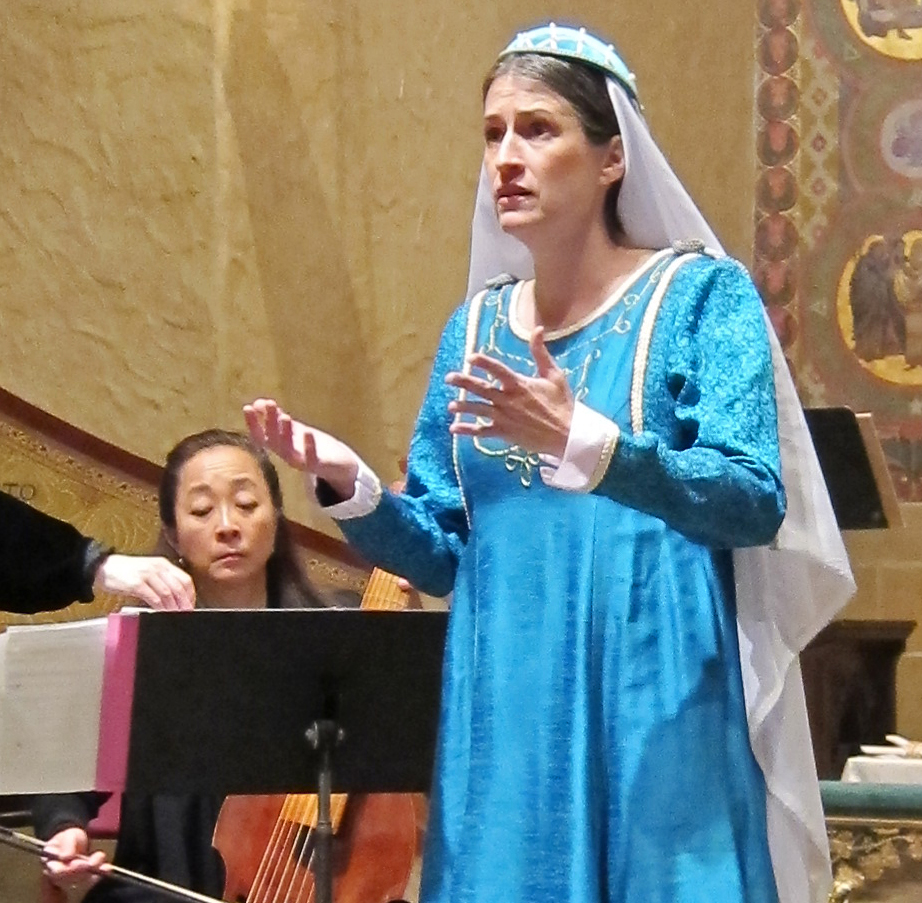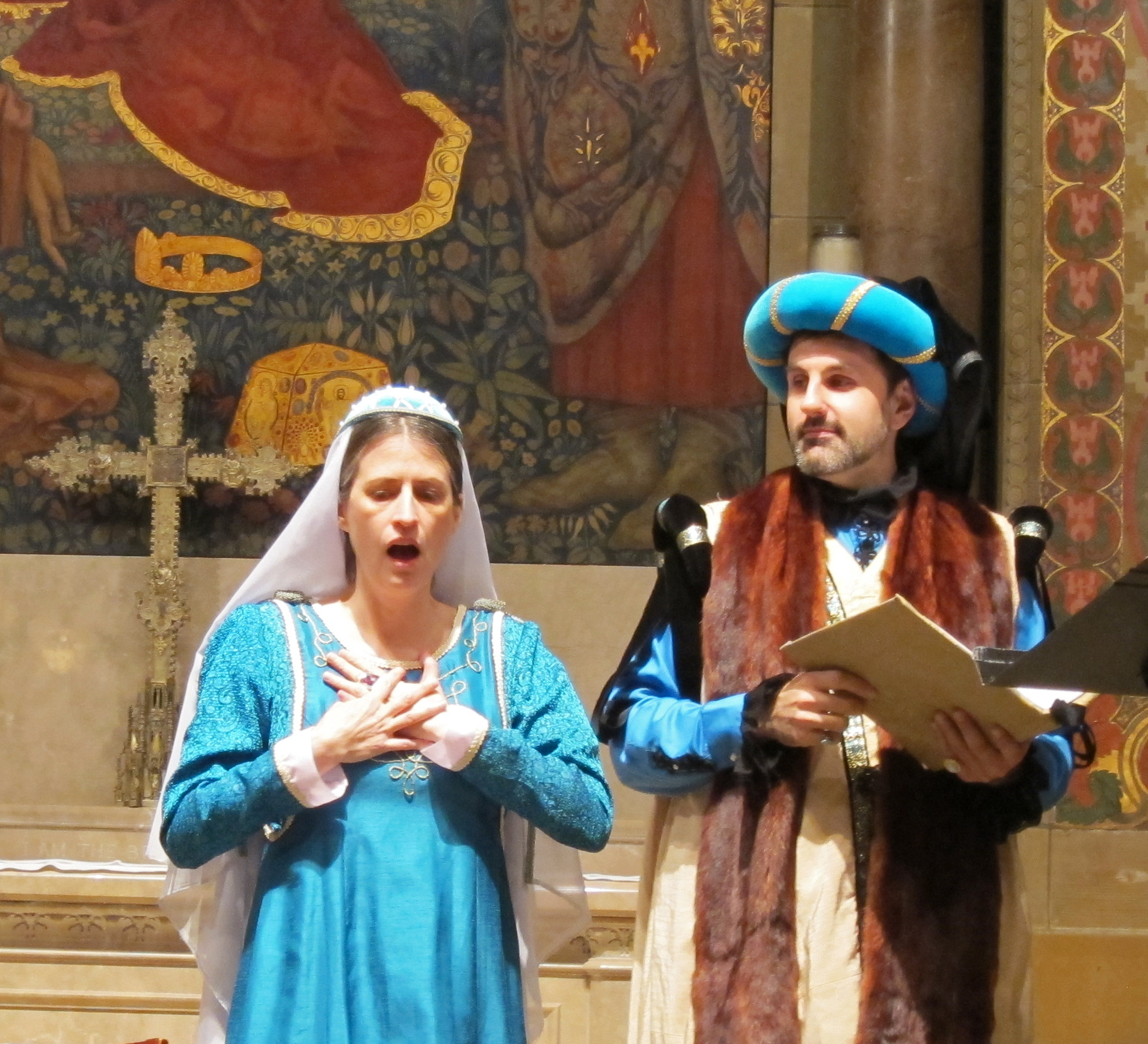This intimate staged Morality Play is comprised of excerpts from two Lenten oratorios by Giovanni Bononcini (1670-1747), both of which center around Mary Magdalene caught between Heaven and Earth. The struggle between Sacred and Profane played itself out in the churches, salons and theaters of the Renaissance and Baroque. We bring this argument to life in selections from these works about the Magdalene, symbol par excellence of humankind’s battle to be good in spite of so many compelling reasons to be bad. Lifted out of its original Biblical context, Magdalene’s Dilemma depicts its central figure as an Everyman representing the Soul caught in the struggle between Sacred and Profane Love. Semi-staged and Costumed.
Forces for Magdelene:
- 3 singers (optional narrator)
- 3-piece chamber ensemble
Running Time:
- 40 minutes
This short program can be expanded to full length with the addition of either Benjamin Britten’s A Ceremony of Carols, or a narrator reading sonnets by John Donne, plus additional instrumental pieces.




+ Program Notes
Beth, our soprano and Obscure Music Sleuth extraordinaire, has long been interested in the personage of Mary Magdalene and, while exploring possibilities for a new group project, she chanced upon a number of musical works centering on la Maddalena, as she is called in Italian. In addition, some of these pieces had in common personifications of Divine Love and Profane Love. Since this trio of characters suited the three of us vocally and promised a plethora of entertaining jabs about type casting, we dove in. Two of the source works unearthed by the enterprising Beth were sacred oratorios by Giovanni Bononcini, each written to be performed during Lent, a period when the opera houses were closed and Music Theater moved into the churches along with the public. Bononcini had a long and varied career, sometimes wildly successful, sometimes on the brink of disgrace. The oratorios from which we compiled Magdalene’s Dilemma were written when he was a very young man and already demonstrate the musical characteristics that built his fame – lively, tuneful and agreeable melodies, an uncomplicated and direct expressivity, and a unique and well-developed contrapuntal style, as demonstrated in several of the duets you’ll hear. The Biblical Mary Magdalene has long been at the center of theological controversy and her story has undergone much in the way of manipulation and reinterpretation throughout the centuries. In modern times, she has come to be generally regarded as the most faithful follower of Jesus and, in many scholarly circles, her status as an apostle rivals even that of Peter. In the Seventeenth and Eighteenth centuries, however, she was seen as the penitent prostitute and as a symbol of the transience of pleasure. As such, she is often depicted in Renaissance and Baroque art surrounded by Vanitas symbols like a skull, a burnt-out candle or a mirror. Far removed from any real plot and devoid of Biblical “signposts,” Magdalene’s Dilemma is much less about Mary herself than it is about the human soul’s struggle between flesh and spirit. Any one of us could substitute ourselves for the Magdalene and sit at the center of this little Morality Play where Earthly Love cajoles, tempts and seduces and Heavenly Love takes the time-honored path of the guilt trip. The scenario presents no middle ground and, as such, neither alternative is wholly satisfactory. Caught between two extremes, Maddalena makes a choice, but perhaps not without some regret. There’s no “Happily Ever After,” but it’s okay because that’s not the point here anyway. More than just a musical time capsule, with Magdalene’s Dilemma we have striven to stay true to the purpose of its original sources: to represent a deep spiritual conflict in a direct and unmistakable way. As told through the language of Bononcini’s youthful, light and tune-filled music, perhaps we can easily and good-naturedly catch a glimpse of ourselves reflected in the thoughtfulness and deep humanity of this long-ago depiction of the Magdalene.
+ Musical Selections
Giovanni Bononcini (1670-1747), music from: * La Maddalena a'piedi di Cristo (libretto by L. Forni), Modena, Lent 1690 ** La conversione di Maddalena (libretto by R. Rodiano), Vienna, Emperor's Chapel, Lent 1701
Sinfonia (Adagio - Largo) *
Da quel destino * (Magdalene) Dormi o Cara … Deh, librate amoretti lascivetti* (Earthly Love) La ragione d'un Alma conseglia … Si ridi* (Heavenly Love) E di Costei sia Campidoglio il Core … Vincerò* (Earthly Love, Heavenly Love) Dite voi Geni superni* (Magdalene)
Maddalena, deh siegui* (Earthly Love, Heavenly Love) Voi del Tartaro* (Earthly Love)
Goderò* (Magdalene, Heavenly Love, Earthly Love) Cor imbelle* (Magdalene)
Oh d'un alma che non ha fede* (Heavenly Love) Pensieri che dite* (Magdalene, Heavenly Love, Earthly Love)
Al pentir/vincer/perder mio * (Magdalene, Heavenly Love, Earthly Love)
+ Performers
- Magdalene: Beth Anne Hatton, soprano
- Heavenly Love: Hayden DeWitt, mezzo-soprano
Earthly Love: Alan Dornak, countertenor
Vita Wallace, baroque violin
- Motomi Igarashi, viola da gamba
- Kelly Savage, harpsichord
“Saw it performed today. Marvelous! Marvelous!”

